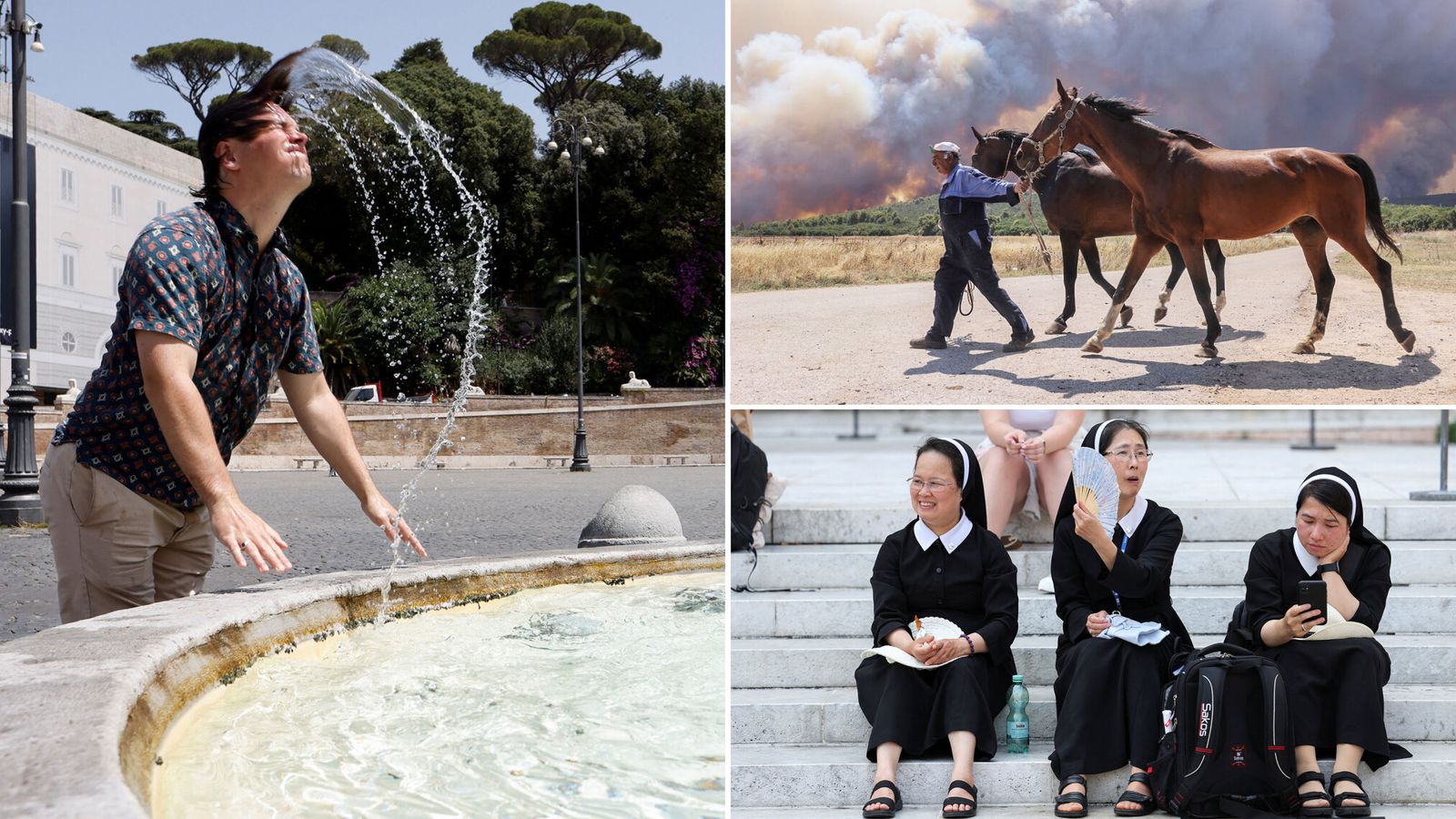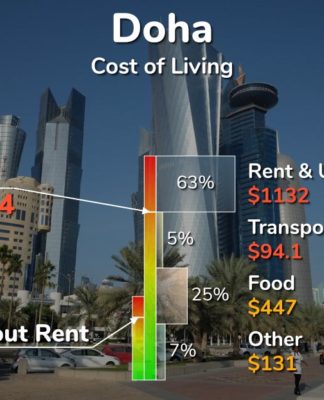Live
Weather – latest: This will be ‘coolest summer for the rest of your life’, warns NASA scientist
The latest updates as heatwaves and extreme weather cause disruption across the globe. Sardinia is expected to see temperatures of 46C today, there are major fires in Greece and Switzerland, and 230,000 people have been evacuated in China due to Typhoon Talim.
Tuesday 18 July 2023 15:45, UK
LIVE
Weather
Pic:AP/Reuters
Image:
(Clockwise) A person cools off at the Piazza del Popolo, Italy, A man evacuates horses as a wildfire burns in Greece and nuns cool off in Bologna. Pic: AP/Reuters
Why you can trust Sky News
Key points
Heatwaves causing disruption across globe – here’s what’s happening where View post
Europe:46C expected in Sardinia View post| Forecast for next five days View post| Forest fires near Athens and in Switzerland View post
Asia:230,000 evacuated at Typhoon Talim hits China View post| 41 dead in rains and landslides in South Korea View post
US:Phoenix to hit 43C for record 19th day in row View post
How sure can we be that this is down to climate change – haven’t we always had heatwaves? View post
This will be ‘coolest summer for the rest of your life’, warns NASA scientist View post
Another heatwave ‘may begin next week’ View post
Why isn’t heatwave affecting UK? View post
Are you in a heatwave in southern Europe or around the world? Send us a message on WhatsApp
Live reporting by Ollie Cooper and Jack Parker
Sort by:
LatestSort by latest OldestSort by oldest
3h ago
06:56
Are you in a heatwave area? Share your story with us
Are you in southern Europe, or another part of the world enduring a heatwave? Has your holiday been affected or are you struggling to cope?
We want to hear your story. You can send us a message on WhatsApp if you would like to be featured in this blog or have any information.
By sending us your video footage/photographs/audio you agree we can broadcast, publish and edit the material and pass it onto others for similar use in any media worldwide, without any payment being due to you. Please do not submit your contribution unless you accept this.
Copy link
1m ago
10:45
Wildfires in Greece and Turkey mapped
Sky News has produced this map detailing the areas wildfires have been recorded by respective fire services by 8.30am this morning.
The data, gathered by Copernicus EMS, shows a number of blazes throughout the Greek and Turkish mainlands and surrounding islands.
Red dots indicate where wildfires have been recorded.
Copy link
15m ago
10:31
Temperatures in Spain break records – reports
Temperatures on the Balearic Islands and the Catalonia region have broken records, according to a weather monitoring service.
Meteored claims that both areas have recorded temperatures upwards of 44C “in the last few minutes”.
“Several stations of Baleares and Cataluna have recorded more than 44C in the last few minutes, breaking several records. In Figures they have passed 45C,” it said on Twitter.
The current Catalonian record is around 43.8C and the Balearic Islands’ high-point is held by Mallorca at 44C.
These newly reported temperatures have not been ratified by a world body (see 11.52am post for more on how temperatures are confirmed and recognised) and won’t be for some time, but if these preliminary reports are accurate, this heatwave is continuing to live up to its reputation as record-breaking.
Copy link
28m ago
10:18
Air quality alert in New Jersey
Plums of smoke from wildfires in Canada have travelled south towards the US state of New jersey, where officials have issued an air quality alert.
The warning advises those considered vulnerable, including the elderly and very young children, should avoid any strenuous activity and limit time spent outside.
The warning is also in effect for tomorrow.
This comes just weeks after previous air quality alerts were put in place in the state for the same reason – as Canadian fires saw smoke pour into the region.
Copy link
Advertisement
44m ago
10:02
Demand for fans and air conditioning sends Italy’s electricity use soaring
Parts of Italy have been seeing temperatures in the mid-to-low 40s already this week – and it’s putting pressure on Italy’s power grid.
The country’s electricity consumption was higher yesterday than at any other point this year, as people switched on fans and air conditioning to cope with the heat.
The chief executive of Terna, which runs the vast majority of Italy’s power grid, predicted usage would be even higher today.
They expect today’s consumption to peak at 58.72GW, just shy of the all-time record (60.5GW) set in July 2015.
Copy link
57m ago
09:49
A siesta to escape the heat? Germany’s health minister thinks so
Germany may be seeing considerably milder temperatures than much of southern Europe – but could daytime naps be the future?
The head of an influential German public health group is encouraging employers to change their schedules, so that workers can take siestas during summer heatwaves.
Dr Johannes Niessen believes people should follow the model for “how people work in the heat in southern countries: get up early, work productively in the morning, and take a siesta at midday”.
Siestas are a practice often associated with Spain, but they’re also common in hotter parts of the world.
“People are not as a productive as normal when it’s very hot,” Dr Niessen said. “Bad sleep due to warm nights can lead to additional concentration problems.”
The idea seems to have got the seal of approval from members of Germany’s government.
Health minister Professor Karl Lauterbach tweeted: “A siesta in the heat is certainly not a bad suggestion. However, employers and employees should negotiate this themselves. From a medical point of view, it certainly makes sense for many professions.”
Dr Niessen also called for an easing of office dress codes, even suggesting those working from home using cold footbaths under their desks to stay cool.
Copy link
1h ago
09:35
Fresh wildfires continue to cause problems in Greece
In the last two hours alone, the Greek fire service has deployed ground and air units to tackle blazes in four different parts of the country.
Chaidari in the Attica region has seen a fire start in low vegetation, with blazes in Chrysokellaria, in Messenia (on the Peloponnese), and on the islands of Irakleia and Lesbos also being tackled by the authorities.
The biggest of these fires, in Dervenochoria, has seen nearly 300 firefighters and a number of aircraft on the ground attempting to quell the blaze.
Copy link
1h ago
09:19
World weather events outlined
There are a number of completely different extreme weather events occurring all at the same time, and it can be a bit much keeping track of what is happening where.
Here is a rundown of what is going on in the world right now:
A large heatwave is dominating much of southern Europe, with thunderstorms expected to the north of the continent.
Another heatwave is blasting the south of the US, and is expected to expand from the southwest to eastern states in the coming days, as we told you earlier (see 12.11pm post).
As in Europe, thunderstorms are gathering above areas facing a heatwave in the north of the continent.
Asia is facing a heatwave inland in central regions, while coastlines are battered by monsoons, tropical storms and a typhoon.
South America has not escaped extreme weather either, with heavy thunderstorms and rainfall hitting the north of the continent and Mexico.
Copy link
1h ago
09:06
This will be ‘the coolest summer for the rest of your life’ – but planet can still cool if action taken, NASA scientist says
A NASA scientist has warned that this summer “will be the coolest” for the rest of people’s lives, as heatwaves continue to devastate Europe and the US, and flooding, monsoons and typhons hit Asia.
“Most people still don’t know what peril they are in,” Peter Kalmus said on Twitter.
“This will be the coolest summer for the rest of your life, and that shouldn’t be just a meme – it should be actually terrifying.”
Mr Kalmus called for the use of fossil fuels to end as soon as possible, before clarifying in a subsequent tweet that “there will always be regional and interannual variation, but in an average sense, heat trends mean this will be the coolest summer for a long time”.
He also said that if the world and society “went into climate emergency mode”, that it was possible for the planet to begin to cool by the end of the century.
Copy link
Advertisement
1h ago
08:52
Heart attacks, dehydration, organ failure – how rising temperatures will affect our bodies (and what we can do about it)
Much of the discussion around climate change focuses on the effects it will have on the planet – but what will rising temperatures do to our bodies?
The World Meteorological Organisation is warning humans could suffer more heart attacks and premature deaths – with a significant factor being that night-time temperatures are remaining high during modern heatwaves.
Fans might make things worse
Professor Ilan Kelman, professor of disasters and health at University College London, says: “If it does not cool down at night, our bodies do not recover from the day’s heat and so death rates rise. Fans might add to our woes if they simply blow hot, humid air onto us, dehydrating us faster.”
Heat-related deaths are already on the rise – a recent study found more than 61,000 died during last summer’s heatwaves in Europe.
A man drinks water amid a heatwave in Madrid, Spain
A man drinks water amid a heatwave in Madrid, Spain
Prof Kelman adds: “When we get too hot, our organs have trouble functioning, so we die. Dehydration is a big killer. Without enough fluids, again our organs cannot work properly.
“Although we are warm-blooded so that we burn calories to regulate our body temperature, we reach limits and summer UK temperatures are exceeding those limits.”
Gloomy stuff – so what advice can he offer?
“Drink plenty of fluids, preferably water – and neither alcohol nor coffee,” Prof Kelman says. “Stay in cool rooms indoors during the hottest part of the day. Do not rely on air conditioning, since widespread use could lead to power outages.”
Experts also warn more frequent heatwaves could cause more deaths at work.
Construction and agricultural workers most affected
Prof Elizabeth Robinson, director of LSE’s Grantham Research Institute on Climate Change and the Environment, believes there aren’t enough health and safety protections to cope with heat…
“There is still insufficient understanding of how worker health is being harmed, the extent to which workers are able to adapt to the reality of increasing frequency and intensity of extreme heat, and the extent to which employers are taking action to protect workers’ health.”
Luis Hernandez, a builder from Mexico, takes a lunch break inside a house under construction during hot weather in Manvel, Texas
Luis Hernandez, a builder from Mexico, takes a lunch break inside a house under construction during hot weather in Manvel, Texas
Experts say construction and agricultural workers could be impacted the most – which could have a knock-on effect on food supply.
Copy link
2h ago
08:40
Large industrial fire near Valletta visible 10 miles away
Malta may be used to hot summers, but above average temperatures appear to have set fire to plastic pipes in Marsa, on the outskirts of Valletta.
A large plume of dark grey smoke was seen in the town of Mellieha, around 10 miles away.
Police initially said it was a grass fire, but officials later confirmed it was caused by plastic and tyre stores near a racecourse.
Chief assistant rescue officer Tony Pisani told Maltese media it started in a pile of stormwater pipes that were “made of plastic and they were exposed to the heat… It could have been there was some grass around the pipes, although I cannot say for certain”.
He also warned burning PVC pipes were releasing poisonous carbon monoxide.
Firefighters say the fire is now under control.
Temperatures of nearly 38C – around six degrees above the norm for July – have gripped Malta for days, and are set to last for the rest of the week.
Copy link
2h ago
08:19
Your stories: Evacuations and wildfires on holiday
Holidaymakers Louise and Terence are in Puglia, southern Italy, and can see a wildfire from their hotel in San Cassiano.
“There is clearly a high alert [among] fire and police services – they had the road closed in minutes,” Terence told us.
Ground temperatures are settling in the 40Cs, and a beach club on the coast has been evacuated, Sky News was told.
We want to hear your story. You can send us a message on WhatsApp if you would like to be featured in this blog or have any information.
Copy link
2h ago
08:04
‘Major’ wildfire every two hours in Sardinia
Sky News understands that there has been a “major” wildfire every two hours on average on the Italian island of Sardinia.
“In the last 24 hours there have been 12 major wildfires in Sardinia,” a source told Sky News producer Simone Baglivo.
The Italian island has seen temperatures in the low-to-mid 40Cs, and is one of the regions worst affected by the Cerberus heatwave.
“Three of them [wildfires] affected a total area of 60,000 square metres.”
Copy link
3h ago
07:44
EU to supply aircraft to Greece to help combat wildfires
The EU’s European Civil Protection Mechanism will supply four aircraft to aid Greece’s battle against wildfires after a senior fire marshal admitted services were facing “a difficult day”.
“The European Civil Protection Mechanism has accepted the request for assistance to our country and four aircraft will be made available to assist in aerial firefighting,” the country’s fire chief said.
Two aircraft from each of Italy and France, who are also battling soaring temperatures, are being sent today.
250 firefighters, 20 aircraft (including nine helicopters) and 75 other vehicles are attending a major wildfire in the Dervenochoria region, which has seen the worst blaze so far.
A massive wildfire continues to devastate Dervenochoria
A massive wildfire continues to devastate Dervenochoria
Copy link
Advertisement
3h ago
07:31
What is El Nino and what does it mean for the planet?
While much of the world grapples with extreme weather events including heatwaves, flooding, monsoons and landslides, more may be on the way – as the El Nino climate phenomenon is building.
El Nino may bring yet more extreme weather events in the coming months – and with it the potential spread of diseases, health problems and food shortages.
But what is it – and when should we expect it to kick in?
What is El Nino?
Meaning “little boy” in Spanish, El Nino is a term used to describe fluctuation in the Earth’s climate system.
In simpler terms, it is the name given to warming of sea surface temperature that occurs every few years.
El Nino is declared when sea temperatures in the tropical eastern Pacific rise 0.5C above average.
The Met Office has made this useful video which explains it further…
What are the effects of El Nino?
During El Nino, warmer water is pushed eastward, with weather conditions heavily affected.
Effects of El Nino include the potential for severe drought and associated food insecurity, flooding, rains, and temperature rises.
These in turn cause a wide range of health problems, including disease outbreaks, malnutrition, heat stress and respiratory diseases.
“[As El Nino gathers] we will see more people’s health affected due to the increase in the extreme weather events that we’ll see,” Dr Modi Mwatsama, head of capacity and field development at Wellcome said.
The US can expect a massive uptake in rain and stormy weather, and marine life will be affected as temperatures and currents vary.
When will we feel the effects of El Nino?
“El Nino is still in its developing stages and typically peaks in December, January and February,” Dr Melissa Lazenby, lecturer at the University of Sussex said.
“Therefore there is likely more extreme events and heat to come globally. This current El Nino looks to peak earlier than usual around September and October.”
Copy link
3h ago
07:25
Watch: Greek residents evacuated as wildfires ravage country
Footage shared by Greek police shows residents being evacuated as wildfires continue to ravage the country.
Police are seen carrying children to vehicles in the city of Neos Kouvaras.
The fire, which began on Monday, has burned through around 30,000 acres and has damaged a number of houses, according to local media.
Copy link
3h ago
07:11
US heatwave to expand eastward as week goes on
US southwestern states have faced record-breaking temperatures as a heatwave blasts the region, but states further east should expect to feel the full force of this extreme weather event as the week wears on.
As the high pressure system over the southwest expands, temperatures will rise to potentially record-breaking heights in the east, AccuWeather meteorologists say.
Much of Texas, including Dallas, should expect temperatures between 38-40C, it says.
Meanwhile, Mississippi, Alabama and Georgia should brace for a rise in temperatures too, according to the latest forecasts.
Copy link
3h ago
06:56
Are you in a heatwave area? Share your story with us
Are you in southern Europe, or another part of the world enduring a heatwave? Has your holiday been affected or are you struggling to cope?
We want to hear your story. You can send us a message on WhatsApp if you would like to be featured in this blog or have any information.
By sending us your video footage/photographs/audio you agree we can broadcast, publish and edit the material and pass it onto others for similar use in any media worldwide, without any payment being due to you. Please do not submit your contribution unless you accept this.
Copy link
3h ago
06:52
Spain’s met office revises high-temp numbers – what is the deal with ever-changing temperature figures?
Earlier, we brought you news that Spain’s met office provisionally recorded a temperature of 47.1C in Villarrobledo, which neared the country’s record of 47.2C.
The office has now removed that figure, with the hottest temperature yesterday in the country now standing at 44.9C in Andujar.
It is worth noting that this figure is preliminary too.
This brings us to a common question we’ve had in the last few days – what is the deal with contradictory, ever-changing and inconsistent reporting of temperature figures?
Local and regional weather offices record provisional figures, before a country’s met office carries out a more thorough investigative process into certain figures, where multiple readings are corroborated and anomalies eliminated.
This is likely the case with this Spanish reading – a local office’s reading was deemed inaccurate for one reason or another, so the provisional figure was removed.
This is the reason for provisional figures – it gives met offices the chance to publish an indication of temperatures with the concession that they can be removed at will after further digging.
Where records are concerned, the World Meteorological Organisation (WMO) is the global authority on temperature figures, and it has a notoriously complex and thorough verification process.
To illustrate that – we’ve only today had confirmation from the WMO that it officially recognises the European record temperature of 48.8C – despite the fact it was registered nearly two full years ago on 11 August, 2021.
Therefore, figures are disputed, investigated and verified at local, regional, national and global levels before a number can finally be ratified and confirmed by the WMO.
Copy link
3h ago
06:49
Marines searching for nine missing in South Korean landslides
We reported in our 8.40 post that a search is under way for nine people missing in landslides
We’ve now seen marines in boats travelling down the Sam River in Yecheon county.
They’re among the 11,000 soldiers the government has deployed to support rescue work.
Parts of South Korea have been devastated by a week of intense rain that has so far killed at least 41 people, and forced over 12,000 people to evacuate.
Pic: Kim Dong-min/Yonhap via AP
Pic: Kim Dong-min/Yonhap via AP
Copy link
Advertisement
4h ago
06:33
Heat wreaking havoc on daily lives of vineyard workers
By Hannah Thomas-Peter, energy and climate correspondent
At the Mancini vineyard in the hills outside Olbia on the Italian island of Sardinia, Alessandro Mancini shows us his vines.
It is not a pretty sight.
“I think I will lose maybe a thousand plants,” he says, adding that the extreme heat makes it very difficult to replant with new seedlings.
He told us that Sardinia is used to very hot summers but what has changed is the duration of heatwaves.
This is the thing that makes his job much harder – the lack of relief for the vines over long periods stresses them to the point where they start to die.
“We try,” he said, “but it’s very difficult.”
The other impact of the heat, which could get up to 46C or 47C in Sardinia today, is how challenging it becomes to work outside.
As we were walking through the vines, three workers, pouring with sweat, busily trimmed and tidied, rushing to finish at 10.30am before the heat of the day kicked in.
“We start at 6am,” said Patrizia Laconi, “otherwise it’s very difficult.”
Her colleague Roberto Puliga nodded, adding that it was all about adaptation. “You have to get used to it” to do the job.
Manuela Casu said that income is important so there is little choice, despite the conditions.
She said: “We have to work, it is our job.”
Copy link
4h ago
06:19
Power shortages worsen in Gaza Strip as heatwave squeezes production
Power shortages in the Gaza Strip have worsened as a heatwave saw temperatures reach nearly 40C in the region.
The territory has endured power shortages for years, often up to 12 hours per day, something officials blame on Israel’s 16-year-long blockade.
Jalal Ismail, the Hamas-appointed chairman of the Gaza Energy Authority, said current shortages are being driven by the soaring heatwave.
Copy link
4h ago
06:07
Another Europe heatwave may begin next week
Europe will get some reprieve this weekend from pressure lingering over the eastern Mediterranean, before a possible second wave next week, according to a leading climate scientist.
“Fortunately, it looks like it’s going to be short and stop by Thursday, or Friday at the most. But there does appear to be something happening again next week, around Tuesday,” Erika Coppola, of the Abdus Salam International Centre, told Sky News.
“We will have two different episodes, one after the other – and this is already the second one this month,” she added.
She added that, while Italians are used to high summer temperatures, it’s the humidity that makes these heatwaves exceptional.
Copy link
4h ago
05:55
How sure can we be that this is down to climate change – haven’t we always had heatwaves?
By Jimmy Rice, news editor for live blogs
The common trope among climate change sceptics is that we’ve always had heatwaves – which, of course, is true. Southern Europe gets hot every year, so why is everybody pinning this on climate change?
Dr Akshay Deoras, meteorologist at the University of Reading, offers this reply: “Heatwaves are common in the northern hemisphere at this time of year.
“However, the temperatures we are expecting in parts of southern Europe in the coming days are what we normally get in the tropical deserts or tropical countries such as India, Pakistan or the Middle East during summer.”
Social media and increasingly polarised public discourse on just about any issue these days means the subtlety of critical debates can be lost.
In the context of heatwaves, no one is saying they are occurring only because of human activity…
“No event is solely attributable to human-induced climate change,” says Dr Karsten Haustein, from the Climate Service Center in Germany.
“Any event is made more or less likely to occur because of it. In that sense the change in risk is what we attribute.
“For heatwaves and extreme hot temperatures, it is safe to say that almost all such events are made (much) more likely due to climate change.
“Some hot extremes – such as the UK temperature record last summer – are so extreme that it’s virtually certain that they wouldn’t have happened without climate change. But that’s still the exception.”
Both the length and intensity of heatwaves will increase as long as we keep warming the planet by emitting greenhouse gases into the atmosphere, Dr Karsten Haustein says.
“It’s simple physics and nothing will change that.”
A third view comes from Professor Hannah Cloke, from the University of Reading, who addresses another common view put forward by sceptics – about the heatwave of 1976. Proof, according to some, that nothing out of the ordinary is happening.
“In previous heatwaves, such as Britain’s hot summer of 1976, other parts of the globe had a relatively cool year. Today’s extremes of weather are increasingly throwing everything everywhere all at once.”
To support this assertion, atmospheric scientist Dr Simon Lee posted these two images on Twitter a few days ago, showing that while “the UK was one of the warmest places relative to normal across the globe” in 1976 “with most areas cooler than average”…
…, now the UK is “just another warm blob in a mostly warmer than normal world”…
Copy link
5h ago
05:45
Flash floods in India kill eight after monsoon
At least eight people have died in the Indian state of Assam after a river burst its banks following heavy monsoon rains.
Water from the Brahmaputra River has engulfed nearly 450 villages in 17 districts in the northeastern state.
Officials confirmed the deaths today and detailed that 115,000 had been displaced following the event.
Additionally, almost half of Assam’s Kaziranga National Park has been left in waist-deep water, leaving rhinos, elephants and deer forced to seek refuge on roads and in human settlements, officials said.
Copy link
Advertisement
5h ago
05:36
Highest-ever temperature in Rome expected today
Rome is set to endure a temperature higher than ever previously recorded later today, if estimates by the country’s meteorological office are correct.
The Servizio Meteorlogico says the Italian capital could reach between 42-43C, which would beat the previous record of 40.5C set in 2007.
Other met offices predict temperatures in Europe could reach as high as 46C today, close to the record set in Sicily in 2021 of 48.8C.
Copy link
5h ago
05:25
Watch: This week’s expected temperatures
The heatwave gripping Europe is unrelenting, with potential record-breaking temperatures possible across the continent.
Southern Europe, particularly the Italy and Spain, are expected to endure their hottest days over tomorrow and Thursday, while Sunday sees France bear the brunt of the heatwave.
Sky News weather producer Joanna Robinson said: “Some places have struggled to drop below 30C at night, giving people no relief to the heat.
“This week, temperatures may climb even higher before extending eastwards, with a peak expected between Tuesday and Thursday.
“Highs close to 47 or 48C are possible, which would threaten the European record.
“Models suggest the heat will ease off a little at the end the week, but temperatures will remain well above average for some time yet.”
Here’s a look at peak temperate forecasts across Europe for the next five days…
Copy link
5h ago
05:10
Phoenix sees record-breaking 19th day above 43C
Arizona is getting little respite from soaring heat – temperatures in its capital Phoenix are set to peak above 43.3C (110F) for a record 19th consecutive day.
The last time Phoenix didn’t reach the 110F threshold was 29 June.
Overnight temperatures in the city, home to 1.6 million people, haven’t dropped below 35C for the past four nights.
“This will likely be one of the most notable periods in our health record in terms of deaths and illness,” said David Hondula, chief heat officer for the City of Phoenix. “Our goal is for that not to be the case.”
Phoenix, Las Vegas and Dallas all remain under “excessive heat warnings” by the federal National Weather Service.
Over 90 million people in 14 US states are currently under some form of heat warning – that’s nearly one in three Americans.
43.9C was recorded in downtown Phoenix, Arizona on Monday
43.9C was recorded in downtown Phoenix, Arizona on Monday
Pic: AP
Copy link
5h ago
04:55
Why travel and insurance companies won’t pay out if you cancel your holiday because of extreme weather
We have discussed this morning that insurance companies won’t pay out if you cancel your holiday due to the threats of extreme heat and weather conditions.
Anna-Marie Duthie, travel insurance expert at Defaqto, told Sky News that the terms and conditions currently mean that travel companies are under no legal pressure to compensate travellers.
“If you are due to travel to Europe but are considering cancelling or moving your trip because you are concerned about the heatwave, this would be classed as a ‘disinclination’ to travel which no insurance provider gives cover for,” she said.
“This could only maybe change if any official advice regarding not travelling to affected countries changed.”
The Foreign Office has issued warnings for travellers heading to Spain, Greece and Italy, but this has had no bearing on insurers as of yet.
Is your holiday affected? Are you thinking about cancelling? Send us a message on WhatsApp
Copy link
6h ago
04:35
WMO preparing for record temperatures
The World Meteorological Organisation (WMO) says it is preparing to obverse and note record temperatures across the world.
The WMO is the recognised authority for recording the highest temperatures, and recently confirmed the European record of 48.8C in Sicily in 2021.
“The World Meteorological Organisation will examine any potential new temperature records as intense heatwaves grip the southern USA, Mediterranean, north Africa, Middle East and some countries in Asia, including China,” a statement on its website said.
If extreme temperatures are observed, the WMO said it said it would “issue a quick preliminary assessment and then start detailed evaluations as part of our painstaking verification process”.
Copy link
Advertisement
6h ago
04:24
UK, and its buildings, ‘dangerously unprepared’ for new climate patterns we’re now seeing
Scientists from the University of Oxford believe the UK is “dangerously unprepared” for new weather patterns brought on by climate change.
They have warned that without large-scale adaptation, such as introducing ceiling fans, better ventilation or shaded protection from the sun’s rays, people may begin to rely on air conditioning.
As we have seen in countries such as China this week, this places strain on the power grid – which in turn produces more greenhouse gases.
iStock
iStock
Dr Radhika Khosla said the UK faces “huge adaptation challenges” but the problem barely features in the government’s planning.
The government’s National Adaptation Plan was criticised by experts and politicians for not going far enough after it was published on Monday.
Speaking before the plan’s publication, Dr Khosla said: “Right now, for example, sustainable cooling barely has a mention in the UK’s net zero strategy.
“Without adequate interventions to promote sustainable cooling we are likely to see a sharp increase in the use of energy guzzling systems like air conditioning, which could further increase emissions and lock us into a vicious cycle of burning fossil fuels to make us feel cooler while making the world outside hotter.”
Dr Khosla is not alone in harbouring these concerns.
Dr Candice Howarth of LSE’s Grantham Institute, a researcher of climate action and heat risks, said heatwaves like the one endured in the UK last year push emergency services towards breaking point.
She said: “It feels like time has flown by, we’re a year on and we’re seeing these horrendous heatwaves across Europe and it feels like this still isn’t really being taken seriously in the UK.
“From a policy perspective, we certainly haven’t seen evidence of there being much of a shift.”
Copy link
6h ago
04:13
In pictures: House left in burned ruins after heatwave causes wildfires near Athens
The burned ruins of a house has been photographed in Lagonisi, just outside Athens.
Wildfires continue to rage across much of Greece, with firefighters still on scene at a number of blazes (see 8.13am post).
We also have these aerial shots of a destroyed house in Kouvaras, also near Athens…
Copy link
6h ago
03:57
What’s causing extreme temperatures worldwide?
Abnormally high temperatures exceeding 40C are being caused by heat domes, which our science and technology editor Tom Clarke says are “the weather equivalent of a pressure cooker”.
“High pressure acts like a lid pushing hot air down, compressing it and making it hotter. As the ground warms it loses moisture, making it easier to heat up.
“The dome of high pressure prevents cooler air or clouds from making their way in.”
It’s effectively a vicious circle. Until the pressure pattern changes, the heat dome will continue to exacerbate hot conditions, bringing a risk of wildfires, drought and heat-health issues.
Why isn’t the UK being affected?
The heatwaves are being held in place by jet streams – which in turn are keeping heat away from places like the UK.
Is this definitely human-caused climate change?
Clarke says: “How our rapidly changing climate influences the jet stream, and the location and duration of heatwaves, is complex and uncertain. What isn’t unclear is the warming trend.”
The temperature of surface water in the north Atlantic is “alarmingly higher than the long-term average. The heat building up in our atmosphere and oceans due to global warming simply has to go somewhere – it’s the energy driving our weather to extremes.”
Copy link
7h ago
03:40
Search for missing continues in South Korea after rains and landslides kill 41
Rescuers are still searching for nine people after massive landslides caused by torrential rains in South Korea.
41 people have died since downpours began on 9 July, with 12,780 people forced to evacuate and some 28,600 households left without power.
The government announced this morning that around 11,000 soldiers will be deployed to help search, rescue and repair efforts today.
Copy link
7h ago
03:28
Three heatwaves occurring simultaneously as records fall or threatened
Heatwaves are affecting three regions at the same time: southern Europe, the western United States, and China.
In Death Valley, California, the disputed highest-ever temperature (56.7C) was set in 1913. As the mercury hit 54C over the weekend, the area was still attracting tourists.
Over 6,500 miles away, China’s hottest ever temperature has provisionally just been recorded. Sanbao saw 52.2C on Sunday, smashing the previous record by 2C.
What’s extraordinary about China is that the country’s low temperature record was broken just six months ago. The northern city of Mohe recorded -53C in January, which means China has experienced a temperature range of 100C this year alone.
The European record is now also under threat.
The World Meteorological Organisation has now accepted a new temperature record for continental Europe of 48.8C measured in Sicily on 11 August 2021.
The Spanish Met Office provisionally recorded 47.1C in the city of Villarrobledo yesterday, and parts of Sardinia could peak at 46C today or tomorrow.
Copy link
Advertisement
7h ago
03:13
Over 300 Greek firefighters battling forest fires | Swiss mountain villages evacuated
Greek authorities battled blazes overnight as forest fires continue to ravage the country.
In its morning update, the fire service confirmed it had extinguished a number of fires, but was still tackling large-scale blazes elsewhere.
Around 230 firefighters are attending fires around the village of Saronida, which is south of Athens. Three helicopters are also helping there.
A further 140 firefighters are in Dervenochoria, tackling a number of fires with the help of six aircraft and a helicopter. 112 local people have been warned of the nearby hazards.
The fire service also said it was receiving help from the Greek armed forces and a number of supporting volunteers.
Wildfires rage in Dervenohoria overnight
Wildfires rage in Dervenohoria overnight
Pic: AP
Meanwhile in Switzerland, a number of mountainside villages were evacuated as 200 firefighters and officials were called to attend a fire in the canton of Valais, near the Italian border.
Copy link
7h ago
02:52
Foreign Office issues warning to tourists travelling to Italy, Greece and Spain as heatwave intensifies
The Foreign Office has issued a warning to tourists travelling to Italy, Greece and Spain amid a heatwave on the continent.
Extreme weather notices have been added to each of the countries’ travel advice pages. It also warns of risks to wildfires.
It advises people to listen to local authorities and follow any and all instructions or advice they give, but warns that holiday companies will not compensate those who choose not to go, as normal terms and conditions apply despite conditions and warnings.
Copy link
8h ago
02:42
Spain nears record-breaking temperatures
The city of Villarrobledo recorded a temperature of 47.1C yesterday, according to the Spanish met office.
AEMET released a list of yesterday’s provisional temperatures this morning, showing highs in Villarrobledo, with fellow central town Andujar recording 44.9C.
The standing record is 47.2C, recorded in the southern city of Montoro in 2021. It registered 44.8C yesterday.
It is important to note that these temperatures are provisional and have not yet been confirmed.
Update: The Spanish met office has revised its temperature list for yesterday, see 11.52am post for latest.
AEMET
AEMET
Copy link
8h ago
02:32
Why is the European heatwave not reaching the UK?
Chris England, Sky News meteorologist
While parts of Europe are experiencing very high temperatures, the UK isn’t.
This is because the jet stream – a core of strong winds about five to seven miles above the Earth’s surface – is currently following a marked north-south wave pattern.
Normally it flows directly westerly, more or less.
The north-south pattern is associated with a series of high and low pressure areas – high to the south and low to the north.
There are, in fact, similarities to the weather patterns that brought the cold snap dubbed the Beast from the East in 2018.
At present, high pressure systems are bringing hot air north over parts of North America, southern Europe, India and China.
These are south of the jet stream, while the low pressure areas to the north are bringing cool, unsettled conditions to places including the UK.
The wave pattern is linked to the distribution of heat around the globe.
It is unlikely to move enough to put the UK in the hotter, southern zone.
Copy link
8h ago
02:30
230,000 evacuated as Typhoon Talim makes landfall in China
Typhoon Talim made landfall in the coastal area of south China’s Guangdong province on Monday night.
Nearly 230,000 people in Guangdong had been evacuated to safety as of 5pm local time, state media Xinhua reported.
Local authorities ordered the closure of 68 coastal tourist destinations, called back 2,702 fishing vessels and ordered 8,262 fish-farming workers to be evacuated ashore, according to Xinhua.
Meanwhile, rescue workers evacuated residents stranded by floodwaters following heavy rainfall brought by Talim in Fuzhou, Fujian province.
We have these pictures…
Copy link
Advertisement
8h ago
02:21
Good morning
Hello and welcome to our live coverage of the global heatwave.
Yesterday, there were widespread evacuations in Greece, as at least six seaside resorts were cleared as heat and high winds spread blazes.
Reports suggest that temperatures could reach up to 46C in Sardinia later today or tomorrow, close to the European record of 48.8C.
And there is set to be little respite in the coming weeks, with meteorologists expecting the heatwave in Europe to last into August.
Separately, Asia and North America are experiencing extreme weather.
Overnight we saw Typhoon Talim hit the south coast of China , with 85mph winds battering Guangdong province. This after China recorded, provisionally, its highest ever temperature on Sunday at 52.2C
And heatwave conditions are continuing in the south and west of the US, and northern parts of Mexico, with temperatures peaking in the mid to high 40s Celsius and not falling below 30C at night for some.
Death Valley in California – the hottest place on Earth – saw a high of 53.3C on Sunday, with temperatures there perhaps getting a little higher still over the next few days.






























